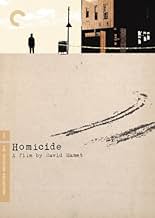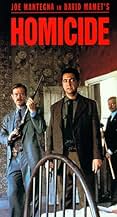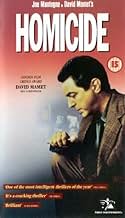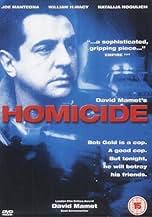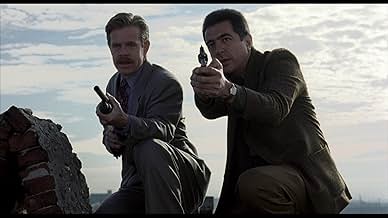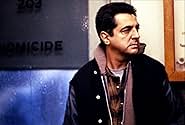Homicide
- 1991
- Tous publics
- 1h 42m
IMDb RATING
6.9/10
8.7K
YOUR RATING
A Jewish homicide detective investigates a seemingly minor murder and falls in with a Zionist group as a result.A Jewish homicide detective investigates a seemingly minor murder and falls in with a Zionist group as a result.A Jewish homicide detective investigates a seemingly minor murder and falls in with a Zionist group as a result.
- Awards
- 3 wins & 6 nominations total
- Director
- Writer
- All cast & crew
- Production, box office & more at IMDbPro
Featured reviews
While this picture could compare favorably with many of its type for nothing more than its use of action, suspense and realistic details regarding police work, it goes significantly further and becomes a character study of a man searching for an identity. A conscientious, no-nonsense detective, Gold has never become involved in his work to the extent that it has made him question his values, let alone his reason for existing. Without the point being forced upon us, we see a character with (seemingly) no home, no friends, no social activities: a decent man who has not connected with anything meaningful in life until circumstances force him to make significant choices.
Especially challenging to the viewer is the deliberately ambiguous ending in which there is reason to believe that Gold could choose either of the major alternatives available to him. He looks and feels like an outsider in the precinct. He now identifies with the Jew as an outsider. Could it be that he is actually considering.....?
See this provocative picture, and decide for yourself. Excellent performances and direction throughout.
Especially challenging to the viewer is the deliberately ambiguous ending in which there is reason to believe that Gold could choose either of the major alternatives available to him. He looks and feels like an outsider in the precinct. He now identifies with the Jew as an outsider. Could it be that he is actually considering.....?
See this provocative picture, and decide for yourself. Excellent performances and direction throughout.
I found the film as riveting and disturbing as most of the other reviewers, but I'd like to comment here on David Mamet's writing style. As one of the earlier reviews points out, Mamet is much admired by the literati, and as another says, he is studied in film schools. So I may be going out on a limb, but I am a lot less impressed with his writing than most.
David Mamet started as a playwright, and he still writes with the theater in mind, even when he writes for movies or TV. I first noticed this a year or so ago when watching a rerun of Hill Street Blues for which he'd written the script. The show had many first-rate TV writers, and there was nothing incongruous in the idea that a celebrated playwright would write an episode. But his episode, while intense, involving, and philosophical in the approved Mamet style, proved out of place as an episode in a long-running series with established characters. Mamet's Hill Street bunch lost familiar character traits and gained others common to nearly all the dramatis personae of his plays. The cops all talked like Mamet characters, had macho-philosophical Mamet dialogues, faced Mamet moments of truth.
Well, here is Homicide, another cop show in full length movie form, and once again his puppets talk like Mamet characters, rather than like distinguishable individuals. These roles are his own creations, so he isn't confronted with a series-watcher's expectations, but that hasn't made them more believable as people. His dialogue has a sameness about it that suggests he doesn't really listen to the way people talk. (Again, I realize this is a minority view: critics are always writing about the "gritty realism" of his characters' speeches.)
Listen to the dialogue from one of the NYPD Blue episodes written by David Milch. (I choose Milch not only because he's one of Blue's best writers [and co-producer, of course] but also because he wrote many of the best Hill Street Blues episodes around the time Mamet wrote his contribution.) The characters are varied, and their choice of words tells the listener more about them as individuals with every line they speak. Mamet characters tend to tell you, not what they are like as people, but what Mamet wants you to think about them. Again and again during Homicide I found myself thinking: "no, he wouldn't say that", or even "does anybody really talk that way?"
Am I saying David Milch is a better writer than David Mamet? I think I am, for realistic media like TV and film, anyway. The theater, as an inherently artifical medium, can absorb and even thrive upon artificiality in its dialogue. But TV and movies have different demands, and I don't think David Mamet meets them very well.
David Mamet started as a playwright, and he still writes with the theater in mind, even when he writes for movies or TV. I first noticed this a year or so ago when watching a rerun of Hill Street Blues for which he'd written the script. The show had many first-rate TV writers, and there was nothing incongruous in the idea that a celebrated playwright would write an episode. But his episode, while intense, involving, and philosophical in the approved Mamet style, proved out of place as an episode in a long-running series with established characters. Mamet's Hill Street bunch lost familiar character traits and gained others common to nearly all the dramatis personae of his plays. The cops all talked like Mamet characters, had macho-philosophical Mamet dialogues, faced Mamet moments of truth.
Well, here is Homicide, another cop show in full length movie form, and once again his puppets talk like Mamet characters, rather than like distinguishable individuals. These roles are his own creations, so he isn't confronted with a series-watcher's expectations, but that hasn't made them more believable as people. His dialogue has a sameness about it that suggests he doesn't really listen to the way people talk. (Again, I realize this is a minority view: critics are always writing about the "gritty realism" of his characters' speeches.)
Listen to the dialogue from one of the NYPD Blue episodes written by David Milch. (I choose Milch not only because he's one of Blue's best writers [and co-producer, of course] but also because he wrote many of the best Hill Street Blues episodes around the time Mamet wrote his contribution.) The characters are varied, and their choice of words tells the listener more about them as individuals with every line they speak. Mamet characters tend to tell you, not what they are like as people, but what Mamet wants you to think about them. Again and again during Homicide I found myself thinking: "no, he wouldn't say that", or even "does anybody really talk that way?"
Am I saying David Milch is a better writer than David Mamet? I think I am, for realistic media like TV and film, anyway. The theater, as an inherently artifical medium, can absorb and even thrive upon artificiality in its dialogue. But TV and movies have different demands, and I don't think David Mamet meets them very well.
While on his way to the case that will make his name, homicide detective Bobby Gold gets sidelined to the scene of a murder of an elderly Jewish woman in a candy shop. Present when the family arrives, Gold is then transferred from his case to this murder much to the annoyance and sympathy of the rest of his team. At first Gold resents the assignment and doesn't believe any of the paranoid theories about the murder put forward by the family, but digging deeper he finds there may be more to the case than he first thought.
I came to this film because I generally like the work of Mamet and specifically the great pattern and flow of dialogue that he delivers. And yet again, in this regard, I was not disappointed because the film does have a great flow to the script that gives each character energy and presence. I always struggle to describe what it is Mamet does (and have failed here as well) but it works and those that know of it will find more of it here. The problem for me does rather lie in the narrative though. The ending is quite unsatisfying and leaves many questions unanswered. Now, to me, I could accept this if the film was about Gold rather than the two cases in play, and, in a way I think that was the intension. However the script is not strong enough to make the film all about his character which is a shame because I wanted to understand him more.
Mantegna delivers the character well anyway. He is the heart of the film and his presence and delivery bring out Mamet's script. He is surrounded by a famous support cast, all of whom do equally as well with the dialogue even if they have lesser roles. Macy, Guastaferro, Wallace and others all turn in good support. So mostly a good film and certainly one that will appeal to fans of other work from Mamet. The narrative may leave some viewers feeling a bit disappointed but it still has enough forward motion and energy to engage throughout.
I came to this film because I generally like the work of Mamet and specifically the great pattern and flow of dialogue that he delivers. And yet again, in this regard, I was not disappointed because the film does have a great flow to the script that gives each character energy and presence. I always struggle to describe what it is Mamet does (and have failed here as well) but it works and those that know of it will find more of it here. The problem for me does rather lie in the narrative though. The ending is quite unsatisfying and leaves many questions unanswered. Now, to me, I could accept this if the film was about Gold rather than the two cases in play, and, in a way I think that was the intension. However the script is not strong enough to make the film all about his character which is a shame because I wanted to understand him more.
Mantegna delivers the character well anyway. He is the heart of the film and his presence and delivery bring out Mamet's script. He is surrounded by a famous support cast, all of whom do equally as well with the dialogue even if they have lesser roles. Macy, Guastaferro, Wallace and others all turn in good support. So mostly a good film and certainly one that will appeal to fans of other work from Mamet. The narrative may leave some viewers feeling a bit disappointed but it still has enough forward motion and energy to engage throughout.
Bobby Gold, a jewish homicide detective involved in tracking down a cop killer, stumbles onto the shooting of an elderly jewish lady. Although starting only very reluctantly, he gets drawn deeper and deeper into this second case, eventually getting involved with a militant pro-Israel group which causes him to question his own identity as a Jew. This naturally leads to neglect of the first case. Bad things happen as a result.
If you like Mamet films, then you'll certainly enjoy this one. As is typical, his tight dialogue creates wonderful tensions with a minimum of words and the acting is excellent. Unfortunately, the movie fails to live up to its promise. Part of the blame is in a relatively weak finale and a conclusion which goes by so fast you'll miss it if you blink. The real problem, however, is that we never develop any intimacy with the human relationships and personal conflicts which should be the heart of the movie but instead just end up providing support for the actual events taking place. We should be leaving the theater with the story playing over and over in our minds for some time to come, but instead we leave simply having been entertained and enthralled for the duration of the film. Not a bad thing, but not as good as it could have been.
If you like Mamet films, then you'll certainly enjoy this one. As is typical, his tight dialogue creates wonderful tensions with a minimum of words and the acting is excellent. Unfortunately, the movie fails to live up to its promise. Part of the blame is in a relatively weak finale and a conclusion which goes by so fast you'll miss it if you blink. The real problem, however, is that we never develop any intimacy with the human relationships and personal conflicts which should be the heart of the movie but instead just end up providing support for the actual events taking place. We should be leaving the theater with the story playing over and over in our minds for some time to come, but instead we leave simply having been entertained and enthralled for the duration of the film. Not a bad thing, but not as good as it could have been.
Not that I thought Joe was incapable of acting, but it's a little hard to take a guy seriously after seeing them in junk like "Baby's Day Out." Nevertheless, he gives a wonderful performance in this very intriguing film that was written and directed by "The Spanish Prisoner's" David Mamet.
Like "The Spanish Prisoner", "Homicide" is a movie that must be paid attention to at all times or you will miss tiny, but very important details. I will admit that I missed a few of these details, but since I watched it in a film class, we discussed it the next day and other people pointed them out. Anyway, this style of work seems to be David Mamet's "signature" and I think it's great. I hope he wins an award some day.
Getting back to the movie, besides containing numerous small details, "Homicide" is a genuinely interesting story about a Jewish cop who has gotten out of touch with his religious side. It is only after he is assigned to a case involving a murdered Jewish woman, does he finally began to get in touch with his roots. Of course there is struggle, not to mention people who do not appear to be what they seemed. It's a good movie, though a little hard to get into at first, but don't let your mind wonder, or you could be missing a vital element to the plot.
Like "The Spanish Prisoner", "Homicide" is a movie that must be paid attention to at all times or you will miss tiny, but very important details. I will admit that I missed a few of these details, but since I watched it in a film class, we discussed it the next day and other people pointed them out. Anyway, this style of work seems to be David Mamet's "signature" and I think it's great. I hope he wins an award some day.
Getting back to the movie, besides containing numerous small details, "Homicide" is a genuinely interesting story about a Jewish cop who has gotten out of touch with his religious side. It is only after he is assigned to a case involving a murdered Jewish woman, does he finally began to get in touch with his roots. Of course there is struggle, not to mention people who do not appear to be what they seemed. It's a good movie, though a little hard to get into at first, but don't let your mind wonder, or you could be missing a vital element to the plot.
Did you know
- TriviaThe film began as an adaptation of David Mamet's friend William J. Caunitz's 1986 novel "Suspects". However, the more Mamet wrote, the more his story diverged from the source material until, with Caunitz's blessing, Mamet left the source book behind entirely, until ultimately the script became an original screenplay.
- GoofsWhen Detective Gold discovers the photo behind the picture, in the picture is a Hebrew sign referring to a road being built by the Labor Federation's (haHistadrut) Solel Boneh division. In the sign it's misspelled "Vistadrut - Solel Bono".
- Quotes
Tim Sullivan: Bob, I'm gonna tell you what the old whore said, and this is the truest thing I know: "When you start cumming with the customers, it's time to quit."
- How long is Homicide?Powered by Alexa
Details
Box office
- Gross US & Canada
- $2,971,661
- Opening weekend US & Canada
- $43,650
- Oct 14, 1991
- Gross worldwide
- $2,971,661
Contribute to this page
Suggest an edit or add missing content



